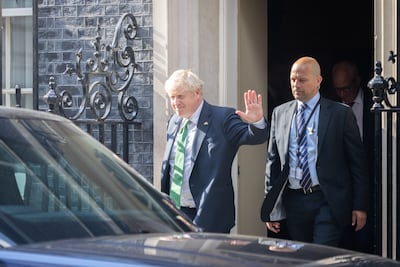As Boris Johnson faces the exit door from his stint as British Prime Minister, it is worth noting that his three years in power have literally transformed the faces of the UK.
The Conservative maverick has presided over a very controversial period for migration policy. In some ways, the populist has totally defied the most base instincts of his supporters to trigger a new wave of immigrants.
London is even more of a world city since Mr Johnson came to power. Throughout his premiership, a handful of initiatives sealed a deeper trend. One example is a scheme for Hongkongers holding UK identity documents to come to the country. Another example is last year's Afghan evacuation policy that filled many hotels in the capital at a time when Covid-19 restrictions reduced tourism. Now, something similar is happening with Ukrainians.
Skills have become the basis of the current government's entry regime. There is a policy to allow graduates to stay and work for two years after earning their degrees in the UK. Merit-based work-migration laws have more broadly been streamlined, triggering a rise in applications.
This shift in emphasis on immigration is often overshadowed by other harsher and more tokenistic migration policies. Zero-tolerance rules, for instance, are badly administered or too experimental. A case in point is the scheme to send those deemed to have entered the country illegally to Rwanda, if they cannot be easily deported elsewhere.

That policy resonates so deeply with the base of the Conservative party that each one of the candidates lined up to replace Mr Johnson as Tory leader – and, therefore, UK prime minister – has endorsed it. Every one of them has pledged to keep on defying the courts and the legal system to get it up and running.
These politicians are being fed by focus groups whose research shows that the policy is popular across the Red Wall, a set of traditionally Labour constituencies that the Tories won in the 2019 parliamentary election. In the party's view, it is a palpable demonstration that the government is working to reduce immigration.
Any other issues around migration are, so far, only being paid lip service in the race to replace Mr Johnson. This would suggest that some of the big changes he initiated will stick.
Take the London suburb of Sutton, a quiet dormitory area in the city's south-west. It has been transformed in two years. Schools have advisers to help integrate Cantonese speakers. Estate agents have opened dedicated Chinese branches on its high street. There is a fully fledged church for the new arrivals.
In central London, meanwhile, new restaurants tend to serve African or Indian fusion food.
The Brexit that Mr Johnson fought for ended the right of free movement for all citizens of the EU into the UK. Put bluntly, the biggest pool of people affected by it comprised of white Eastern European blue-collar workers and clerical and service staff.
But the rigid, Australian-style points-based migration system that was promised by many in the campaign to leave the EU in 2016 never came into play. David Frost, the hardliner who was Mr Johnson’s Brexit negotiator, warned last week that the Conservatives must show net migration coming down.
According to researchers, migration ranks second only behind the UK’s cost-of-living crisis as a concern among the Conservative party's 2019 voters. And about three quarters of those surveyed feel that the issue is being managed badly.

Mr Johnson is a so-called liberal Leaver, while the majority of the new voters are culturally conservative in a way that he is not.
The attack lines are already forming in think tanks and among political forums. Net migration to the UK this year could be about 200,000, and because of the nature of the influx, the annual cost of supporting new arrivals is pushing $10 billion.
If consultations with local voters is anything to go by, then academics are clearly seeing a vulnerability to emerge from Mr Johnson’s enthusiasm for high and skilled migration. Whether this policy is retained will depend on how strong-willed the new leader is, and what pressures the economic downturn bring to bear.
Widening out the focus of the debate, there is much to be gained from a high-net migration figure. An effort to make the immigration policy more competent, particularly in relation to tackling illegal arrivals, and, yes, deportations as well, would bring far greater dividends to the UK as a whole.
A reforming prime minister would really try to get to grips with that great challenge. If successful, the reputational dividend would be immense, particularly in the wake of Mr Johnson’s legacy.
The UK is in what is known as demographic decline. The rapidly ageing society needs migration to protect long-term economic growth.
The question, then, comes down to whether or not the country, or the supporters of its governing party at least, are happy to sacrifice future prosperity so that the country does not become culturally, ethnically and socially diverse as a result of migration.
Despite his short tenure in power, Mr Johnson has created a legacy that will play out for years to come.


